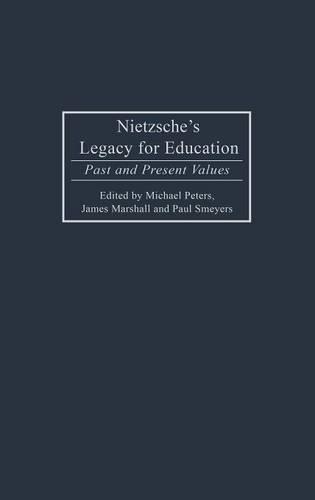
Nietzsche's Legacy for Education: Past and Present Values
(Hardback)
Publishing Details
Nietzsche's Legacy for Education: Past and Present Values
By (Author) James Marshall
By (author) Michael Peters
By (author) Paul Smeyers
Bloomsbury Publishing PLC
Praeger Publishers Inc
30th October 2000
United States
Classifications
Tertiary Education
Non Fiction
Educational administration and organization
370.1
Physical Properties
Hardback
264
Description
Despite being one of the greatest educators of the 19th century (perhaps of the modern period) and one of the greatest moral philosophers of all time, Nietzsche's educational thought and works, with some notable exceptions, have been ignored, or remain hidden and obscured. This was true of his philosophy as a whole and its recent reception, first by French poststructuralist thinkers during the 1960s and 1970s, and later by English-speaking philosophers in the 1980s. The controversy surrounding Nietzsche involves not only his style (his way of doing philosophy) and the radical nature of his inquiries, but also the history of Nietzscheanism, the politicization of the Nietzsche archive, and his appropriation by the Nazis. This international collection is unique in that it draws upon these recent developments in the interpretation of thought and the question of defining value in the era of postmodernity. The essays address a range of topics, including the history of the reception of Nietzsche's work, Nietzsche's early educational writings, genealogy as method, ethics and difference, democracy, Nietzsche's notion of self and its importance for education, the arts, the limits of academic life, Nietzsche's critique of liberal education, Irigaray's Nietzsche, and Nietzsche's critique of modernity and the question of nihilism.
Reviews
While some might argue with the editors' claim that Nietzsche was perhaps one of the greatest educators of the modern period, all readers will come away with a new appreciation for the way Nietzsche's powerful critique of mainstream views can inform educational ideas and practices....Recommended for graduate, faculty, and research collections.-Choice
"While some might argue with the editors' claim that Nietzsche was perhaps one of the greatest educators of the modern period, all readers will come away with a new appreciation for the way Nietzsche's powerful critique of mainstream views can inform educational ideas and practices....Recommended for graduate, faculty, and research collections."-Choice
Author Bio
MICHAEL PETERS is Associate Professor of Education at the University of Auckland, New Zealand./e JAMES MARSHALL is Professor of Education at the University of Auckland, New Zealand./e PAUL SMEYERS is Professor in the Faculty of Psychology and Educational Sciences, University of Leuven, Belgium./e
